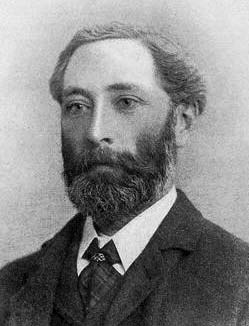


 تاريخ الرياضيات
تاريخ الرياضيات
 الرياضيات في الحضارات المختلفة
الرياضيات في الحضارات المختلفة 
 الرياضيات المتقطعة
الرياضيات المتقطعة
 الجبر
الجبر
 الهندسة
الهندسة 
 المعادلات التفاضلية و التكاملية
المعادلات التفاضلية و التكاملية 
 التحليل
التحليل
 علماء الرياضيات
علماء الرياضيات |
Read More
Date: 26-2-2017
Date: 3-3-2017
Date: 25-2-2017
|
Died: 4 April 1925 in Elmside, Cambridge, England

Walter Rouse Ball's father was Walter Frederick Ball who was a rents and dividends man born at St George Hanover Square, Middlesex about 1824. His mather was Mary Ann Ball born Marylebone, Middlesex in about 1830. He had a younger sister Mary born at St George Hanover Square about 1853.
After attending school in London, Rouse Ball entered University College, London, where he studied mathematics, logic, and moral philosophy. His performance in mathematics was outstanding, and he was awarded the Gold Medal in that subject. After graduating from University College, he matriculated at Trinity College Cambridge in 1871. Three years later he was Second Wrangler in the Mathematical Tripos (which means that he was ranked second in the list of those awarded First Class degrees).
In 1874, the year he sat the Tripos, he was also first Smith's prizeman, and in the following year he was elected a fellow of Trinity College, Cambridge. In 1876 he became a barrister when he was called to the Bar by the Inner Temple. He only had a short career as a barrister, which saw him practising as an equity draftsman and conveyancer, and writing Student's guide to the Bar. In 1877 he returned to teaching mathematics when he acted as deputy to Clifford at University College London whose health had collapsed through overwork.
In 1878 Trinity College, Cambridge, invited Rouse Ball to return as a lecturer in mathematics and, two years later, he was appointed as assistant tutor. He is best known as an historian of mathematics but he also made a large contribution in many different posts within Trinity College. He was appointed Director of Mathematical Studies at Trinity in 1891, and promoted to senior tutor in 1898. Also in 1898 he became chairman of the College Council and he acted as moderator of the Mathematical Tripos on a number of occasions. He also held posts within the wider university administration including sitting on the University Financial Board. Outside the University of Cambridge he also undertook a number of important duties, including being representative of the University on the Borough Council and various other bodies. He was also a governor of Westminster School and of Perse School. A fellow governor of Westminster School wrote:-
Trinity College, Cambridge, has during the 40 years for which I have been a governor sent us some excellent representatives, but none better than the late Mr Rouse Ball. He was constant in attendance and an excellent colleague. He acted as auditor of our accounts and took our finances under his special charge. With these he was careful and prudent, but never hesitated to recommend judicious outlay.
Rouse Ball wrote A short account of the history of mathematics (1888) which provided a very readable and popular account of the subject. The fourth edition of 1908 was reprinted in 1960. He was also the author of the very popular Mathematical Recreations and Essays first published in 1892 which has run to fourteen editions (the last four being revised by H S M Coxeter).
The success of the book is attested to by the fact that 10 editions, and many reprintings, appeared during Rouse Ball's lifetime .... The year 1939 saw the appearance of the 11th edition, incorporating substantial revisions by Coxeter. ... despite the many changes and improvements that have been incorporated over the years, the book still has the flavour of the original Rouse Ball.
It would be impossible to describe the contents but we will mention a few topics covered. Chapters on mechanical recreations, bees and their cells, and string figures were in Rouse Ball's original text but were omitted in Coxeter's revision. Topics such as colouring of maps, magic squares, chessboard problems and tessellations remained. It also contained many early examples of mathematical conjuring.
Ball also wrote The genesis and history of Newton's Principia and The history of mathematical studies at Cambridge. His work in history, however, was not confined to mathematics. He wrote a history of the First Trinity Boat Club, and histories of other university and college societies. From this we may deduce that he had a keen interest in rowing, and he also contributed the this sport by acting as treasurer of the University Boat Club.
Ball's contributions are summed up in [1]:-
Generations of Trinity men benefited by his mathematical teaching; he was the historian of mathematics, of the College, and of the First Trinity Boat Club; and the University profited in various ways by his administrative ability.
Articles:



|
|
|
|
دخلت غرفة فنسيت ماذا تريد من داخلها.. خبير يفسر الحالة
|
|
|
|
|
|
|
ثورة طبية.. ابتكار أصغر جهاز لتنظيم ضربات القلب في العالم
|
|
|
|
|
|
|
سماحة السيد الصافي يؤكد ضرورة تعريف المجتمعات بأهمية مبادئ أهل البيت (عليهم السلام) في إيجاد حلول للمشاكل الاجتماعية
|
|
|